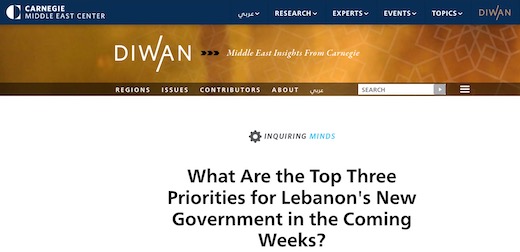Dr. Nasser Saidi was asked to provide his responses to the question “What Are the Top Three Priorities for Lebanon’s New Government in the Coming Weeks?” as part of a comment in Inquiring Minds, published by Diwan (Middle East Insights from Carnegie) on 30th Jan 2020. The comment is posted below and link to the original article is here.
What Are the Top Three Priorities for Lebanon’s New Government in the Coming Weeks?
Nasser al-Saidi | President of Nasser Saidi & Associates, former Lebanese economy minister
The Lebanese government must focus, first, on a macro-fiscal-financial-banking program. Lebanon’s key macroeconomic indicators point to a severe economic, financial, banking, currency, and current account crisis: a fiscal deficit of 15 percent of GDP and climbing; a sovereign debt equivalent to 160 percent or more of GDP; inflation nearing 30 percent; a depreciation of the Lebanese pound in the parallel market of around 40 percent; and officially declared international reserves of $31.5 billion, while Morgan Stanley estimated net reserves at $11.5 billion at the end of 2019.
The immediate step required is for a ministerial crisis task force (not another “committee”) tasked to prepare a macro-fiscal-financial-banking reform plan, in coordination with the International Monetary Fund (IMF) and the World Bank to include sovereign and central bank debt restructuring. The aim is to rapidly, within the next four weeks, establish an Economic Stabilization and Liquidity Fund for Lebanon, multilaterally funded by the IMF and World Bank, along with the Paris IV participants amounting to some $25 billion in order to stabilize the economy, support growth promoting infrastructure investment (in partnership with the private sector), fiscal reform, balance of payments support, banking sector (including the central bank) restructuring and debt restructuring, by providing guarantees of principal of restructured, longer maturity debt.
Second, the government must provide a social safety net. The sharp drop in economic activity (given the lack of government, business, and consumer confidence amid growing protests) has led to growing layoffs and unemployment, business closures and bankruptcies, falling incomes, a severe decline in household consumption, thereby pushing more people into poverty. The World Bank estimates the extreme poverty rate, that is people below the food poverty level, at 20 percent of the population (760,000)*, while 41 percent of the population (1,500,000) is below the poverty line. The government needs to set-up a targeted social safety net (via cash transfers mainly) to provide support for the elderly and most vulnerable segments during the painful reform process, with the aim of lowering inequality and reducing poverty in the medium term.
Third, the government must introduce an anti-corruption and stolen asset recovery program. Endemic corruption, bribery, nepotism are a cancer eating and destroying Lebanon’s economy and its social and political fabric. Lebanon is the 37th most corrupt nation out of total 180 countries. Protestors have, justifiably, focused on high-level corruption. The new government must prioritize combating corruption at all levels by appointing and empowering a special anti-corruption prosecutor and unit and implementing an anti-corruption program with respect to taxation and revenue collection as well as reforming government procurement law and procedures. In addition, the state must recover assets that have illicitly and criminally appropriated by politicians and their associates.
Recovering stolen assets can be a wealth-generating strategy if implemented properly with complete transparency. Lebanon will require international cooperation and building appropriate capacity to support asset recovery. It must abolish the Banking Secrecy Law of 1956, lifting the veil on the misappropriated monies and assets of politicians, their cronies, and civil servants.






